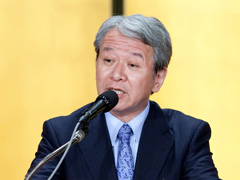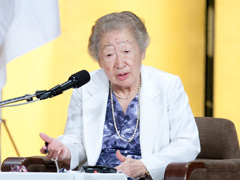The country suffers from the second-highest maternal mortality rate in the world. *¹
Thirty-percent of the country’s 24 million population survive on less than one dollar a day. *²
It is ranked 180 out of 182 in corruption.*³
Afghanistan remains in a perilous state even after a decade of international development and military assistance and will face another major challenge when the International Security Assistance Force (ISAF) withdraws and turns security over to Afghan forces in 2014.
The recent Tokyo Conference on Afghanistan co-hosted by Japan and Afghanistan and attended by some 80 nations and international organizations was held July 8 to plan long-term reconstruction assistance and a Tokyo Mutual Accountability Framework was established to continuously monitor progress in such areas as economic growth, corruption prevention and budget requirements.
Minister of Foreign Affairs Koichiro Gemba announced around three billion dollars in Japanese assistance during the next five years in such areas as improving security and socio-economic development.

JICA President Akihiko Tanaka addresses the Tokyo International Conference
Akihiko Tanaka, the President of the Japan International Cooperation Agency, which will carry out the bulk of Japan’s assistance in Afghanistan, addressed the conference. JICA also held two parallel events to discuss the achievements and lessons learned during the past decade of assistance as well as peace and stability issues and the role of the international community.
President Tanaka addressed issues such as how best to ‘reach the people’, how best to ‘empower these people’ and how they could best benefit from development assistance.
“I believe it will be of critical importance for our efforts in development during the transition and the following decade to help Afghans do for themselves by themselves”—in other words self-help, he said.
He added that Afghan communities must be encouraged to take ‘ownership and the initiative’ in development, mid and long-term support from the international community must be aligned with Afghanistan’s own development strategy, and a greater focus should be placed on capacity building.
Tanaka highlighted JICA’s experience dating from the 1960s with its special emphasis on capacity building and said, “JICA will continue toplay a substantial role in Japan’s support to Afghanistan for as long as necessary.”
Sadako Ogata, President Tanaka’s predecessor and currently his special advisor, noted in a presentation at one of the parallel events that “Winners get everything, losers lose everything. That kind of outcome is not very good in decision making.”
She added, “The first step is that everybody gets something. This kind of trust in governance is very important and a useful condition for development.”
She urged donor countries and aid organizations to incorporate this concept into their future planning.

Former JICA President Sadako Ogata at a parallel event in Tokyo
Following a keynote speech by Afghanistan’s Minister of Rural Rehabilitation and Development, Wais Barmak, JICA also made a presentation on its activities in the past decade, sharing ‘lessons learned’ together with two non-governmental organizations, the Aga Khan Development Network (AKDN) and the Asia Foundation in Afghanistan.
(*¹)UN data, 2009
(*²)Central Statistics Organization, 2010
(*³)US Department of State, 2011




scroll